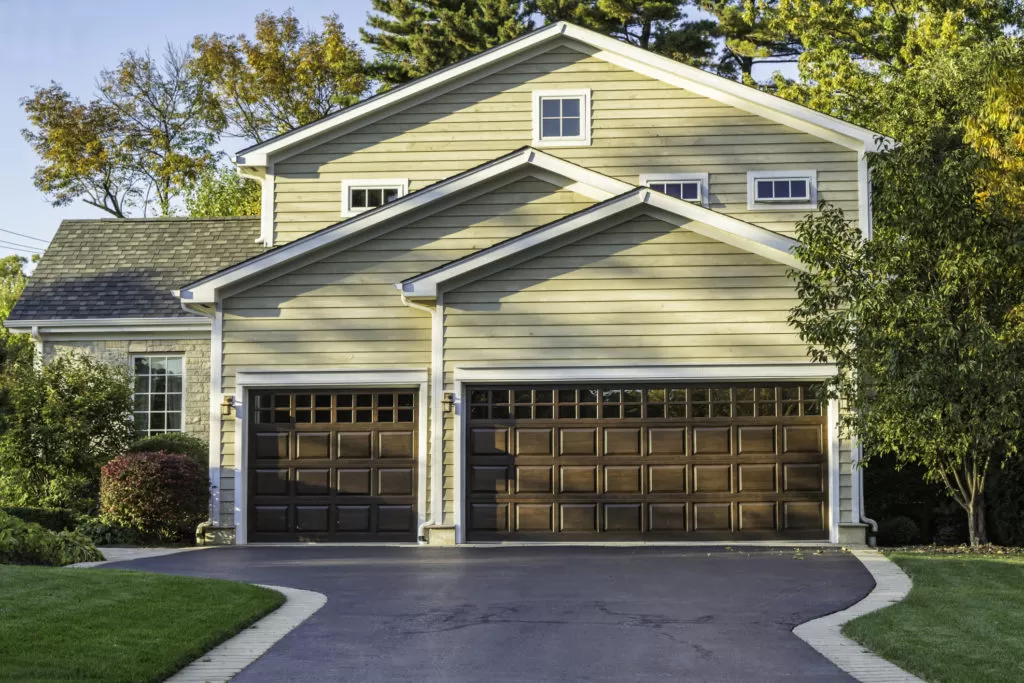Ready to change out your garage door? Once you start shopping around, you’ll see there are plenty of options for you to choose from. That makes it harder to decide which material you should choose. Here are all the most common garage door materials that you’ll have available and why you’ll want to choose them for your home.
1. Steel
Steel is the most common garage door material you’ll see on the market now. They’re popular for residential and commercial use, as they have a lot of benefits. Firstly, they hold up well in all climates, so you don’t have to worry too much about the weather taking its toll on the door.
It’s also very hard-wearing, and when you have a steel garage door installed, you’ll see they typically come with the most extended warranties. Steel has been a common garage door material for so long because it’s a hard-wearing and lightweight material, making it easier to open and close while still keeping its shape and structure.
They’re low maintenance, too, as you’ll need to clean them down to get them looking and working at their best. Finally, it’s very easy to add foam insulation to the door as you install it. This helps you maintain the temperature in your garage, perfect if you use it for other activities than storing your car.
There are a couple of drawbacks that you should be aware of. Firstly, they can be prone to corrosion over time, so that’s something you’ll want to keep an eye on when inspecting your garage door. Also, steel can dent if hit hard enough, although you can now get heavier gauge steel.
2. Wood
This is the other most common garage door material that you’ll see on other homes. Wood has a lot of advantages as it really looks great. It goes with many different exterior styles, and you can pick from many types of wood to get the look you want. That will also tie in with any other wood on your homes, such as doors or trims.
Wood garage doors always work best in drier environments with moderate temperatures. If they are well maintained, they’ll also last for years. Of course, wood garage doors won’t be for you if you live in a wetter or more humid environment. They can start to warp or even rot when exposed to moisture.
They’re also heavier than other garage doors, which can impact the type of garage door opener you use. They also take some more upkeep than other garage door materials, which need to be refinished regularly.
3. Wood Alternative Doors
If you like wood garage doors look, but wood doors aren’t suitable for you, you can get wood alternatives for your garage. There are many different options, and they all look like the real thing. There are doors available that use wood overlaid onto steel, which is perfect if you want the real thing with the reinforcement of steel.
For example, you can go for wood-grain textured steel doors. These are engraved to look just wood, so you can get the look you want with the benefits of a steel garage door. Woodgrain vinyl on steel is another option, as it gives you the character of wood with the strength of steel.
4. Aluminum and Glass
This is a newer garage door material, so it brings you many unique benefits. If you want a more contemporary-styled garage door, then this is what you’re looking for. They can be used with anodized or powder coatings, making them great for coastal areas or anywhere with high humidity levels.
There are lots of customization options, so you can make that garage door fit in with the rest of your home. You can choose from many different colors and use different inserts to give them a unique look.
That includes window inserts, perfect for letting light in during the day. Considering these garage door materials, be aware that they tend to be more expensive than steel. Also, it has a lower R-value due to the lack of insulation on them.
5. Fiberglass
Here’s another more modern garage door material that’s becoming more common. Many homeowners are using fiberglass as it can be molded into any kind of design that you’d want. As such, there’s a wide range of looks for you to choose from.
They’re also great for insulation, as the doors can be filled with foam insulation. That makes them great for garages that are used for storage, workshops, and so on. They require very little maintenance, too, so you won’t have to spend long taking care of them.
Typically, you’ll simply need to apply a clear protective coating every few years, and that’s it. Be aware that fiberglass isn’t the best material for more extreme climates. The underlying material can go yellow, and it can even start to crack during colder temperatures.
6. Vinyl Garage Doors
Vinyl is a popular substitute for wood garage doors, and they have some advantages over wood. They’re much more lightweight, so they’re easier to open and close. They’re also resistant to corrosion, cracks, and scratches. They’re best for those living in moderate climates.
Vinyl won’t be for everyone, though, as it’s not as strong as other garage door materials. For example, if it’s not UV-protected, the color will start to fade. You’ll also see that they’re not as long-lasting as other materials on the market.
Final Thoughts
These are just a few of the garage door materials available to you as a homeowner if you’re looking to replace your garage door. There are so many options out there, so you can pick something that works for you and suits your home and your climate.
Talk to your local garage door service today to find the right material for you. If your garage needs maintenance or repairs, Your Garage Door Guys is ready to help! We are available in Los Angeles and Ventura counties.

